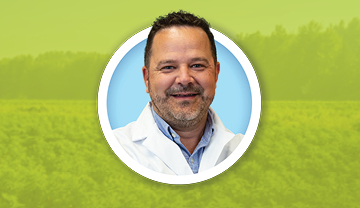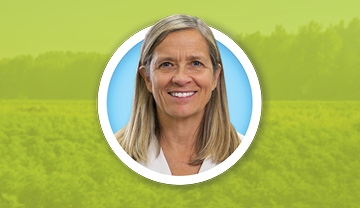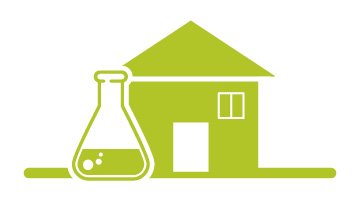
Dr. Helen Tai
Research Scientist - Plant Genetics and Genomics
Fredericton Research and Development Centre
Why did you become a scientist?
I've always had a fascination with living things and how they worked. I also come from a family of scientists—my father was a potato breeder at the Fredericton Research and Development Centre. So even though I didn't start out studying plants (my PhD was in mammalian genetics) I feel very lucky to be back where I grew up, studying potatoes. I guess it's true what they say about the apple not falling far from the tree!
Meet Dr. Helen Tai
Video transcript
[Upbeat, cheerful music begins.]
[Helen Tai and a colleague exit a side door on the research centre holding harvesting tools and walking towards a potato field.]
[A green geotag icon appears on the bottom of the screen with text.]
Text on screen: Fredericton, New Brunswick.
Voice of Helen Tai: A lot of Canadians consume potatoes. It is the third largest crop in the world...
[Cut to Helen and her colleague harvesting potatoes from the field.]
Helen: ...in terms of human consumption.
[Cut to close up of them examining and dusting off the potatoes.]
Helen: One of the reasons I was very interested in coming to work with Agriculture and Agri-Food Canada was the opportunity to make an impact on the environment through genetics.
[Cut to Helen Tao in her lab close up for an interview. A white and green banner crosses the bottom of screen with text.]
Text on screen: Helen Tai, Ph.D. Research Scientist – Plant genetics and genomics. Agriculture and Agri-Food Canada.
Helen: I am Helen Tai, i'm a research scientist with Agriculture and Agri-Food Canada. My field of study is plant genetics and genomics.
[Cut to one of Helen's team members close-up examining plant samples in a test tube.]
[Pan over the rest of the lab to another team member working on a computer.]
Helen: We are looking at genes that give potatoes greater resistance against diseases and pests, and we are also looking at genes that make the potatoes more enjoyable for consumers.
[Cut to clip of racks upon racks of test tubes filled with plant specimens.]
Helen: Sometimes I say, It's kind of like online dating...
[Pan to Helen and two other colleagues looking at a computer.]
[Cut to data on computer screen.]
Helen: you try and figure out what makes two people click, we try to figure out what will make two potatoes click...
[Cut to a researchers hands placing drops of a chemical on a specimen slab.]
Helen:...to produce and progeny potato that has some of the traits that we are really interested in.
[Cut to a clip of a colorado potato beetle crawling on a researchers gloved hand.]
Helen: Colorado potato beetle is currently controlled using pesticides, ...
[Cut to lab assistant taking clippings from a potato plant leaf.]
Helen: ...it's a devastating pest the growers are very concerned about it.
[Cut to close-up of lab assistant placing the clippings in test tube with tweezers.]
Helen: The public is concerned about the methods that we use to control it.
[Cut back to Helen.]
Helen: So what we would try to do is have a plant that has carried a natural resistance to the beetle.
[Cut to a piece of scientific equipment filling test tubes with a chemical mixture.]
[Cut to clip of scientist observing the machine working.]
Helen: And part of my work has been to understand the mechanisms of that resistance so that we can bring forward plants that have those characteristics that deter the Colorado potato beetle.
[Cut to clip of Helen and a female lab assistant walking down a hallway.]
[Cut to clip of scientist examining a specimen in a test tube close-up.]
[Cut back to Helen talking.]
Helen: I think that we are bringing things further ahead in terms of sustainability both environmental sustainability, and economic sustainability of potato production.
[Cut to an ending text screen on a white backgorund.]
Text on screen: Learn more at agr.gc.ca/fields-of-science. We cover a lot of ground.
[Screen fades into the Canada wordmark. The uplifting, rhythmic music fades out.]
Profile
What do you like the most about your job?
The research work is exciting; I am able to make discoveries about basic science and apply these to improving crops and their production. Another aspect that I enjoy is working with my colleagues at Agriculture and Agri-Food Canada (AAFC) and outside AAFC. The scientific community and the AAFC community are made up of great people.
What is the coolest fact about your field of science?
The cost of DNA sequencing has dropped drastically in the last 20 years—about ten thousand-fold. This has resulted in major changes in the way we study biology and agriculture. It has created great amounts of knowledge and increased our ability to develop improved crops and crop management strategies.
What is your favorite food?
I have lots, but here are two favourites: potato chips and red bean paste steamed buns.
What is the funniest thing that has happened to you at work?
We were asked to do summaries of our scientific papers using an online system, and several of us encountered difficulties entering the information when the software was first launched. I decided to test the system with a summary of only two words: "awesome study". I never received a confirmation that my summary was successfully submitted, so I figured the system was not working and reported this to management.
A few weeks later, I received an email that stated that I was invited to be a summaries mentor "based on the summary I submitted". I guess my "awesome study" did eventually reach someone in the system.
Wild relatives are always welcome in this lab
Imagine gathering 200 wild relatives from all over the world to discover their best characteristics. That's what Agriculture and Agri-Food Canada potato breeder Dr. Helen Tai sees every day. At the Fredericton Research and Development Centre, she and her team look at the huge genetic diversity found in potatoes from around the world—including wild, exotic species—to make better quality spuds for Canadians.
Some of the varieties they work with—from as far away as Peru—are related to our domestic potatoes. These potatoes from around the world have natural defenses that have served them well through the ages, fighting diseases and pests. And Dr. Tai is a fan.
"Potato populations are a tremendous resource", she says. "We recognize that the wealth of diversity available in potatoes may not exist in other plant species."
Lately, she has called on some of those wild species to fight the dreaded Colorado potato beetle. It is a small, striped bug that causes more damage than any other insect to Canada's $1 billion potato crop, and it's tough to keep in check. Producers need powerful pesticides to control these bugs, but eventually, the pesticides stop working as the bugs develop a resistance.
Some exotic potatoes produce their own natural chemicals that keep pests away. For example, beetles don't like the taste of the leaves of those varieties, so they avoid them.
That's a cue for Dr. Tai. She and her team found pest-repelling genes and were able to breed two new varieties of potatoes that resist beetles. In fact, in research trials, the number of potato beetles feeding on the plants dropped by one-half.
The new varieties require fewer pesticides, which is better for the environment, saves farmers money, and is music to the ears of consumers. That's why, in Dr. Tai's lab, wild relatives are always welcome.


